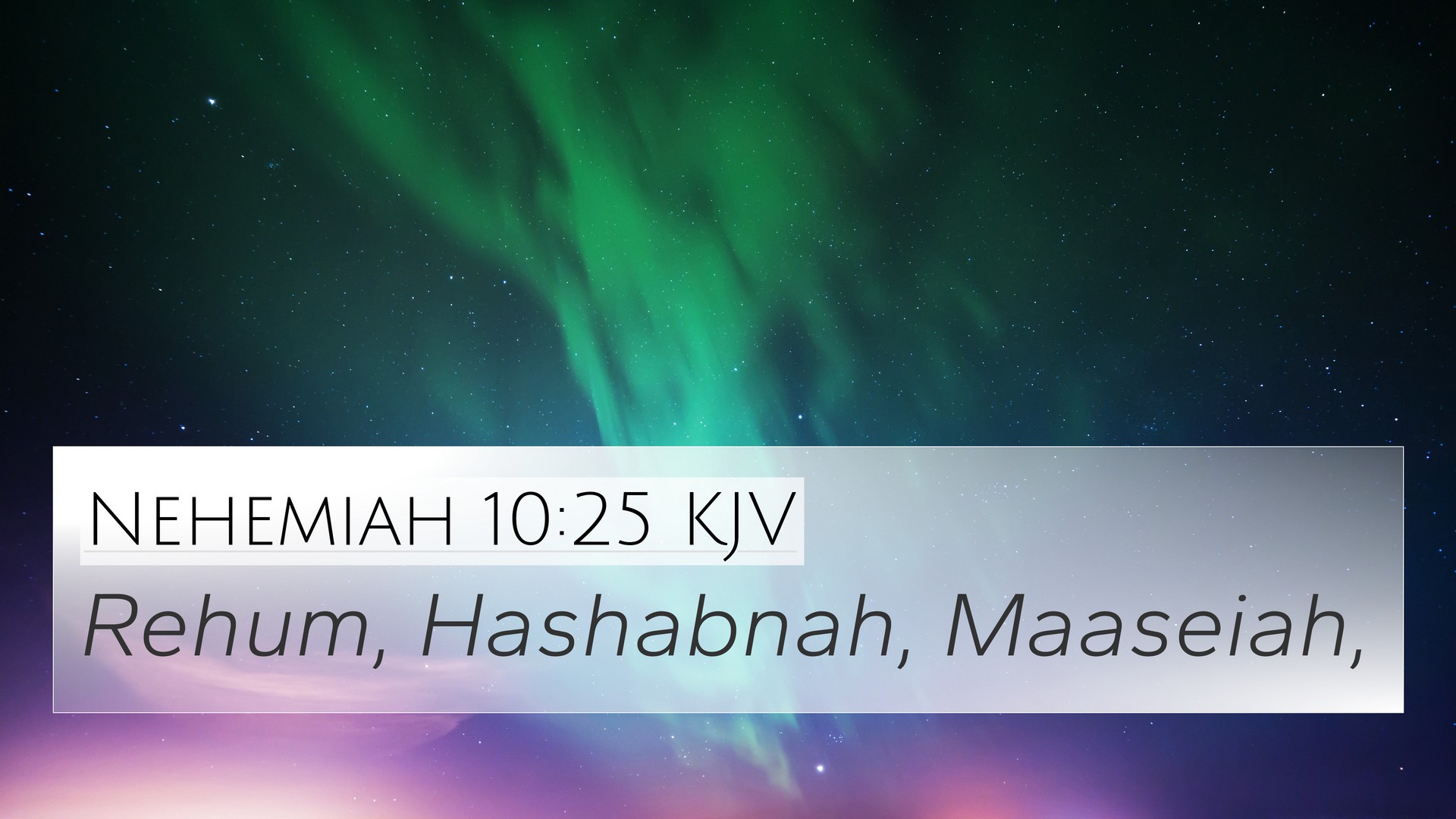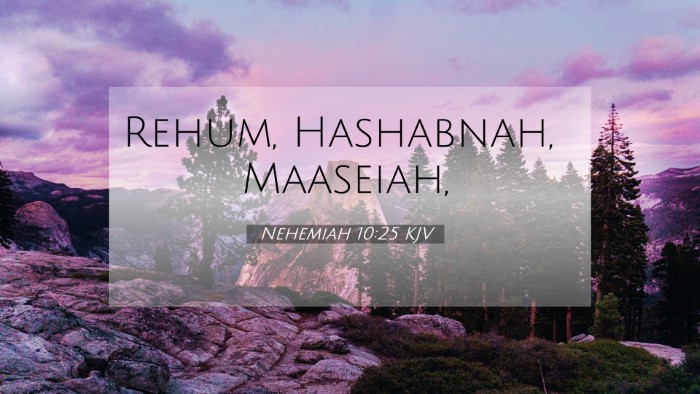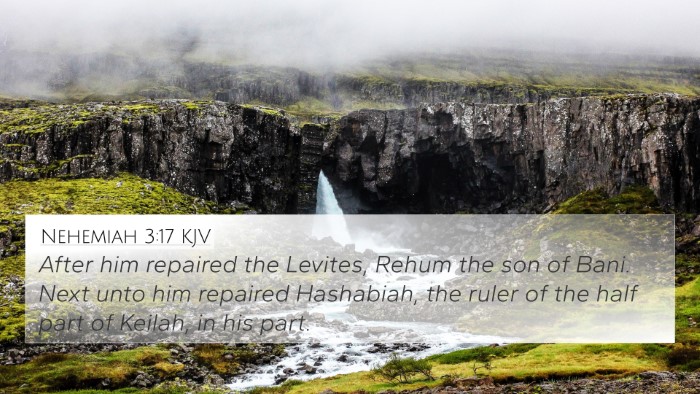Understanding Nehemiah 10:25
The verse Nehemiah 10:25 states:
"And we cast the lots among the priests, the Levites, and the people, for the wood offering, to bring it into the house of our God, after the houses of our fathers, at times appointed year by year, to burn upon the altar of the Lord our God, as it is written in the law."
Summary of Meaning
Nehemiah 10:25 portrays a significant moment of communal commitment among the returned exiles of Judah. This passage reflects their dedication to reinstate and uphold God’s commandments with specific reference to the practice of offering wood for sacrificial purposes.
Contextual Overview
This verse comes from a larger covenant renewal narrative where the people of Israel recommit themselves to following God's laws after their return from Babylonian exile. The preceding and succeeding verses allude to their resolve to maintain worship and the offerings prescribed by the law.
Insights from Commentaries
-
Matthew Henry:
Henry emphasizes the symbolic act of casting lots, deriving its significance from the communal involvement and the sober responsibility taken by the people. He interprets this as a means of ensuring a systematic and divinely appointed way of carrying out their duty to God, illustrating their collective agreement to uphold the responsibilities set forth in the law.
-
Albert Barnes:
Barnes notes the organizational aspect of the verse, highlighting the importance of order and structure in worship practices. He states that the systematic arrangement for the wood offering not only showcases their commitment but also serves as a model of how God's people should operate in unity and dedication to divine service.
-
Adam Clarke:
Clarke elaborates on the significance of the ‘wood offering’ as vital for the burnt offerings. He links it to the rituals described in the Levitical laws, positing that this act reflects obedience to God’s statutes and conveys an understanding of the critical role of offerings in maintaining a right relationship with God.
Cross-References
This verse connects with various other scripture passages that help to illuminate its significance:
- Leviticus 1:7: Discusses the role of priests in offering sacrifices, which is foundational for understanding the offerings in Nehemiah's time.
- Deuteronomy 16:10: Provides instructions regarding the feast of weeks and offerings, reinforcing the communal aspects of worship.
- Numbers 15:3: Notes the requirement of offerings from the community, illustrating continuity across the law.
- 2 Chronicles 29:34: Reflects the organization of offerings by priests, showing a pattern of communal commitment.
- Ezra 3:5: Highlights the importance of offerings when the altar was rebuilt, denoting continuity of practice in Israel's worship history.
- Hebrews 13:15: Draws a New Testament connection, showing the relevance of offerings and sacrifices of praise in worship today.
- 1 Chronicles 9:32: Provides insight into the Levites’ role in maintaining temple worship, paralleling the responsibilities highlighted in Nehemiah.
- Malachi 1:7: Critiques the neglect of offerings in post-exilic times, underscoring the importance of Nehemiah’s commitment.
- Joshua 9:27: Discusses offerings and assignments in service, illustrating the historical precedent of biblical community practices.
- Romans 12:1: Encourages believers to present their bodies as living sacrifices, linking the principles of sacrifice enduring through faith.
Thematic Connections
Nehemiah 10:25 forms a part of a broader theme in Scripture concerning covenant loyalty, worship practices, and communal responsibilities:
-
Faithfulness to God's Commandments:
Expresses the expectation of Israel to adhere strictly to God’s laws post-exile.
-
The Role of Community:
The verse emphasizes collective responsibility, a recurring theme in the Old Testament that finds reflections in the New Testament church.
-
Sacrificial System:
The necessity of offerings is highlighted throughout Scripture, showing the continuity of God's grace and requirement for atonement.
Lessons from Nehemiah 10:25
Several lessons can be drawn from this verse, impactful for both ancient and modern audiences:
- Commitment to Worship: The verse serves as a reminder of the importance of intentionality and commitment to worship in our lives.
- Community Engagement: It underscores the significance of collective participation in community rituals and instruction.
- Obedience to God’s Word: A critical takeaway is the call to be obedient to God’s laws as an expression of faith.
- Stewardship: The act of bringing offerings reflects on the stewardship of resources and time for spiritual purposes.
Conclusion
In conclusion, Nehemiah 10:25 is a pivotal verse that encapsulates the spirit of renewal among the returned exiles, emphasizing the importance of community, worship, and obedience to God's commandments. Through various commentaries, we can gain deeper insights into how this verse connects with other Scripture and its enduring implications for both historical and contemporary faith practices.
Final Thoughts on Cross-Referencing
Engaging in cross-referencing biblical texts enhances our understanding and illustrates the comprehensive narrative of Scripture. Utilizing tools for effective Bible cross-referencing can significantly deepen one’s study and interpretation, connecting various dots within the biblical framework.
We encourage readers to explore the connections between Bible verses, utilizing available Bible reference resources as they study the rich tapestry of God’s Word.
Whether studying to prepare a sermon or for personal edification, remembering how closely intertwined the Scriptures are helps illuminate the work of God throughout history.



